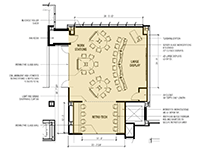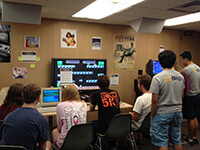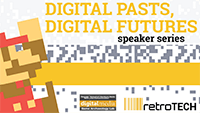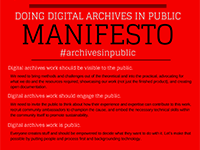retroTECH
Established in 2015
http://library.gatech.edu/retrotech
Staff: interdisciplinary team of 6 library employees and 1 graduate student, for a combined total of 1.5 FTE

The name retroTECH adroitly sums up Georgia Tech (GT) Library’s digital scholarship space and its fundamental raison d’être, which is further emphasized by the website tagline: “Hack the past, design the future.” In a nutshell, retroTECH aims to provide the Georgia Tech community with opportunities to “create the future by exploring the past.” Or to state it more expansively, the “retro” in retroTECH refers to a “highly curated combination of classic, vintage hardware and software” that can be used in combination with modern tools for digital archiving. The library’s vision is a compelling one; the aim is: to “inspire a cultural mindset that emphasizes the importance of personal archives, open access to digital heritage, and long-term thinking.”

Established in 2015 in a temporary space and adopting a deliberate pilot model outlook, retroTECH did not coalesce into its current form immediately. Rather, it was the result of a great deal of thought and concerted effort on the part of a large team. ARL spoke with Wendy Hagenmaier, digital collections archivist, along with several of her colleagues, including Isabel Altamirano, liaison librarian for three engineering majors plus chemistry and biochemistry; Erin Edmond, former GT 1000 First-Year Seminar library liaison and public services associate; Heidi Lowe, IT support professional; Miles Raphael, graduate student in computer science; Jody Thompson, head of archives; and Alison Valk, multimedia instruction librarian and subject librarian for the College of Computing.
Hagenmaier described some of the critical factors that led up to the 2015 launch. First, the library was in the process of being completely redefined after about 95% of its physical collections were relocated off site. As a result, extensive user interviews were conducted across the campus in 2013 to gauge student, faculty and staff perspectives regarding future library directions. One of those interviewed was postdoctoral fellow Jason Ellis, who studies science fiction and vintage computing. His suggestion to consider retrocomputing as an overarching theme proved to be a defining moment.

The theme of retrocomputing resonated across a campus that is primarily technical in nature. That convergence of an opportunity and the spark of an idea triggered a great deal of work to develop prototypes and pitches. One of the first successful pitches targeted the notion of a pop-up exhibit that would examine human interaction with technology, fueled by hardware items that anyone on campus chose to lend for temporary display, alongside a label describing why the item was personally significant to them. When Ellis donated a small seed collection of four computers and software, the opportunity arose to integrate these older technologies into course assignments. The acquired hardware was first housed in the archives reading room, in a small retro “nook” that was quickly outgrown. It was at this stage that the pilot space that retroTECH now occupies became available and the equipment was relocated. In 2018, after the renewal of one of the GT Library’s main buildings, retroTECH will move into a permanent location, adjacent to a high-tech Visualization Lab, bringing together the past and the future into one technologically rich space.
Hagenmaier pointed to other elements that were unfolding in tandem with space decisions. Work on articulating vision, mission, and collection development policies helped define what sets retroTECH apart—its focus on providing access to vintage and often rare equipment so that users can have hands-on experiences with the history of technology, and its emphasis on the preservation of born-digital personal archives.
As is evident from the listing of core team members above, the retroTECH team benefits from an array of different perspectives, each of which represents an essential piece of the whole. Subject liaison librarians Valk and Altamirano bring their connections with their respective faculties and provide important communication channels to promote retroTECH. Lowe, Hagenmaier, and Thompson bring deep expertise in digital archives and digital archaeology. Hagenmaier noted that, in future, the formation of an advisory board would serve the team well. Such a board could include faculty, community leaders, and alumni whose respective areas of expertise could help in determining what to acquire and what (and how) to repair.
While the lab is indeed a physical space, the idea is for retroTECH to reflect programming that takes place in both physical and virtual spaces. And when it comes to physical spaces, the team ventures well beyond the boundaries of the university and into the heart of the surrounding communities. Those technologies that are mobile are taken on the road regularly—into classrooms and to maker fairs, providing access to many who would otherwise not have it.

Within Georgia Tech’s own student population, not all visitors are technical or engineering based. First-year English classes with a focus on multimodal communication descended on the lab, interested in learning more about the history of video games and of human-computer interaction.
From the research perspective, it’s clear that faculty have been formative influences from the very beginning. Ellis’s suggestion in 2013 served as the genesis behind retroTECH (he is now assistant professor of English at the New York City College of Technology). Hagenmaier identified Laine Nooney, formerly assistant professor of digital media at Georgia Tech and currently assistant professor of media and information industries at New York University, as another important contributor with whom retroTECH created a speaker series, supported by a successful grant application. Bill Leahy, director of the Division of Computing Instruction and senior lecturer in the Georgia Tech College of Computing has his own collection of vintage technologies and has provided guidance and inspiration. Clearly, the growth and evolution of retroTECH is very much driven by research interests. This extends to graduate students as well—Miles Raphael (noted above) is the first graduate student member of the retroTECH team.
Some concerns around sustainability of this model do arise; a particular challenge is creating a sustainable strategy for running and maintaining the specialized vintage equipment and software. The retroTECH team hopes to partner with campus community experts to sustain the collection and engage in peer-to-peer education about the histories of technology. The team also hopes to work with the Software Preservation Network to build solutions for long-term access to software for historical research. Valk added another essential consideration: what hardware and software and analog devices should be acquired going forward, to build a small, representative collection? What does a collection development policy look like in this landscape?
Featured ProjectsDigital Pasts, Digital Futures Speaker Series
Doing Digital Archives in Public Manifesto
Save This Site!
|
Conclusion
Over the coming year, the retroTECH team looks forward to launching its two mobile labs: the Emulation Time Machine, a modern workstation built by research assistant Raphael and set up to run all kinds of emulators that transport users back through time, and the Archive-O-Matic, a workstation individuals can use to preserve and interact with their own digital archives. In partnership with the Atlanta Area Digital Archives Meetup, the retroTECH team will use the O-Matic at the Atlanta Maker Faire to transfer data from 3.5-inch floppy disks brought by Maker Faire attendees to flash drives. The team also looks forward to collaborating with GT’s new data visualization specialist, Ximin Mi, to solidify plans for the new retroTECH and Visualization Lab spaces that will open in 2018.
In the long-term, the team hopes retroTECH will start conversations with Georgia Tech’s communities, through which the library and its stakeholders can work together to grow a model of peer-to-peer digital archiving and a culture that values empathy and shared exploration of our diverse technological pasts.
Catherine Davidson | digschol@arl.org | August 31, 2017





